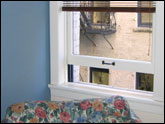Dear Umbra,
My friend and I have been having a debate that I hope you can help us settle. What is the rule of thumb when turning off the air and opening the windows? I live in Texas and in the spring we have one or two days in a row that are cool enough for open windows followed by four that are not. Should I open the windows when it is nice only to have to close them again and turn the air on in a day or two? Does it cost more to re-cool my apartment than it would to just leave the windows closed and the air on?
Tara
Commerce, Texas
Dearest Tara,

Keep an open mind — and open
windows.
Please turn off your air conditioner as often as you can. The AC will need to expend more energy to re-cool the house than it will to maintain a cool house, but only for a brief period of time. As with home heating, this added energy expenditure over a short period does not justify the constant use of the AC over a longer period. In addition, there are health benefits (physical and mental) to opening your windows.
I hope you read my recent Cool Like That column, in which I enumerated various natural ventilation methods that can replace or accompany air-conditioning. If you’re not home during the day, turn the AC off when you leave, keeping windows and doors closed and shuttered. If the outside air is cooler when you come home, open the windows (strategically, for breeze suction), even if you think you’ll need to turn on the AC during the evening. All this will help your electric bill by reducing not only the heat in the inside air but also the stored heat in the house objects.
Although it’s best to keep all windows shut while AC is in effect, you can ease the load on the air-conditioning via strategic fan placement. Ceiling fans will mix hot and cool air in an effect I think of as dilution. Your air-conditioning is just cooling and re-cooling the same dang air, and this dilution uses the just-cooled air to pre-cool the next-to-be-cooled air. Fans placed on high shelves may also help with this dilution.
I want to take this opportunity to remind us all of the three body-cooling categories: convection, radiation, and perspiration. Fans help us with convection, the movement of cooler air across our skin, which carries away our body heat. Venting the house during cool periods helps with radiation. (Bookshelves, Barcaloungers, and clothes washers made hot from air or operation will radiate heat toward our bodies. If we remove objects’ stored heat via ventilation, they will stop bothering us and may even absorb our own radiating heat.) Perspiration is our very own special swamp cooler. We produce moisture, it carries away our body’s heat, and if convection gets involved, too, so much the better. I was in the Soviet Union years ago, a fact I can now confess, and we drank hot tea during scorching days. It helped us cool down, just as the babushkas said it would. And yes, it was very hot there — in Moscow, not in Noverybnoye.
Dasvidanya-ly,
Umbra

